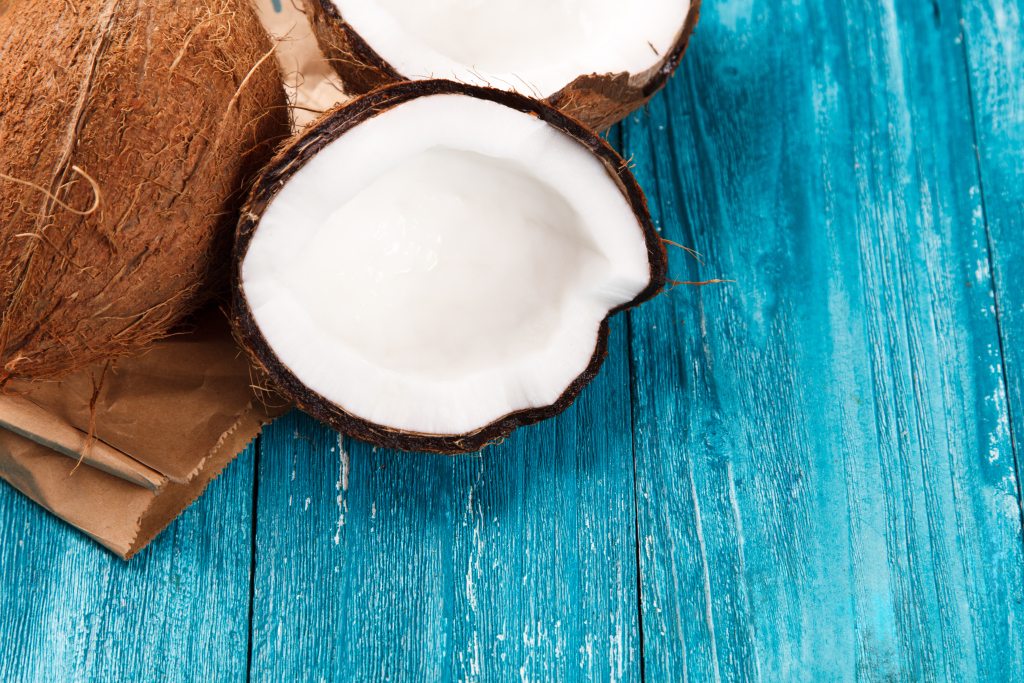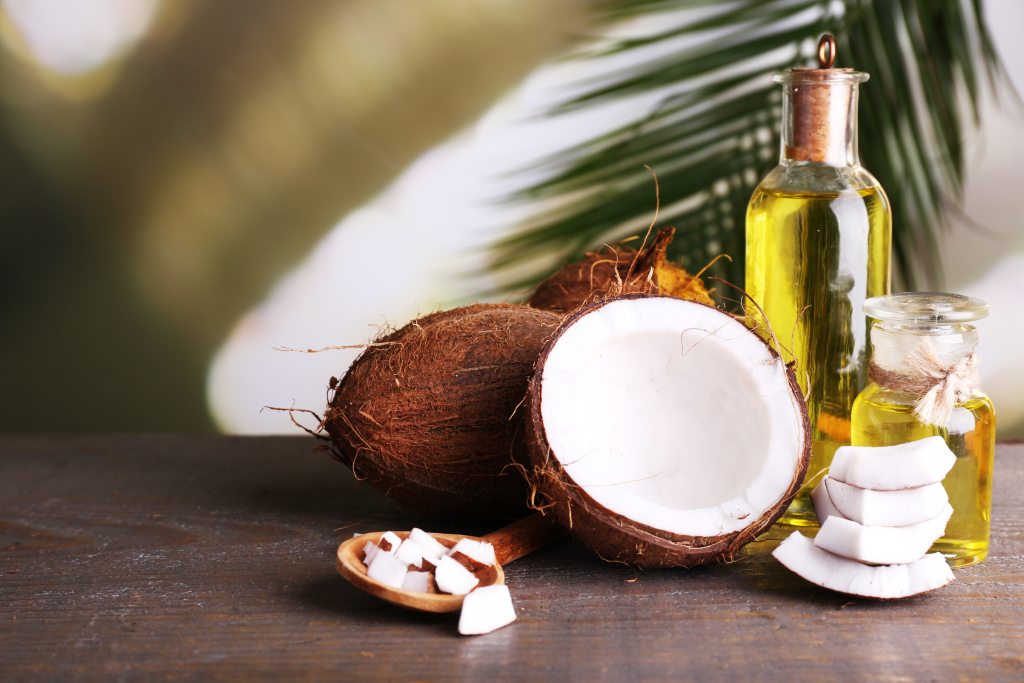Trend Alert: The Coconut. Every time I go to the market, I see some new coconut product jumping out at me… if it’s not a new coconut water brand, it’s a new type of coconut yogurt, butter, cream, sugar and even now ice cream and alcohol! What’s next?! But people haven’t always been so loco for the coco. While in the past, coconuts were thrown under the bus for their high saturated fat content, it wasn’t until recently that they gained mainstream popularity. No, they didn’t shed their fat. People just shed light on the actual benefits of the fruit that’s been eaten for centuries.
So let’s break it down: There are young coconuts and mature coconuts. The young ones are green or have a white husk. They have the most water and the meat of the coconut is soft and gel-like. These babies provide us with our coconut water or juice, as some call it. The mature ones are brown and very hairy with firm, sweet meat and not much water at all. Coconut milk is made from grating and squeezing the meat of coconut. Coconut oil, is the fatty oil from the coconut meat.
Coconuts always remind me of my family vacations to the Dominican Republic, where the gardeners would actually climb up palm trees and cut down the coconuts and slice them open with their machetes. Don’t get me wrong, while that seems like a dangerous, daunting and hard task, it was even harder finding the famous coconut man, or “el coquero,” of the hotel, who claimed monopoly on the coconuts. He was a busy man, but we’d eventually find him everyday!
Let’s take a closer look at their benefits:
Coconut Water
A $400 million industry–bottled coconut water is the next best alternative to drinking it straight out of the coconut. I prefer ZICO for it’s taste and quality.
Benefits:
- Fat-Free & Low-cal
- Detox & Immunity Boost: Contains lauric acid- the same kind that is found in human breast milk. It’s antiviral, antibacterial, and anti-fungal properties combined with it’s antioxidants can help boost immunity and help fight off viruses and acne, which can potentially help clear your complexion if you drink enough.
- Re-hydration: Contains 5 electrolytes: sodium, magnesium, calcium, potassium, phosphorus. The nutrients help with re-hydration after a workout or if you suffer from dehydration. Coconut water contains 15 times more potassium than a sports drink and has 1-2 times as much potassium as a banana.
- Common Hangover Cure 😉 – After a night of partying, you need to restore the nutrients in your body & rehydrate!
- Energy Boost: For a natural energy boost and healthy, refreshing drink!
Coconut Oil
Coconut oil is about 92 percent saturated fat. Before you freak out- the fatty acids in coconut oil are primarily medium-chain triglycerides (MCTs), which are shorter than the long-chain triglycerides found in other fats (think meat) and oils that take a longer time for the body to process and are usually stored as fat. MCTs are more easily metabolized by the body, which is why they’re found in infant formulas and used to nourish hospital patients. So not all fats are the same! Coconut oil shouldn’t replace the other oils you already use to cook with, but should instead be used in combination in your diet. Only virgin coconut oil should be used- avoid any coconut oil labeled hydrogenated because it contains trans-fats, which is a big no no!
Benefits:
- Metabolism & Energy- MCTs oils go directly to the liver and are instantly converted into usable energy, speeding up metabolism in the body by burning calories. Athletes use coconut oil because of the MCTs and their ability to provide energy and an efficient source of fuel pre-workout.
- Immunity Boost: Just like the water, coconut oil contains lauric acid to help fight off viruses and bacteria.
- Skin & Hair: Coconut oil can also be applied topically. It’s a great remedy to treat skin and scalp dryness and add moisture. The antioxidants and vitamins nourish the skin and help with repair.
Coconut Milk
66% of the fat in coconut milk comes from MCTs and it contains less protein and calcium than dairy milk. But it does contain manganese, phosphorous, iron, magnesium, selenium, potassium, zinc, copper and insoluble fiber, which are all essential nutrients for a healthy body. Look for the unsweetened brands as they contain less calories than the sweetened versions. There is still a lot of controversy and mixed reviews about coconut milk, so I’d keep intake low as each glass does have a lot of calories and fat and may exceed your appropriate daily amount. You can always add a little to your coffee, if you like the taste!
Coconut Flakes
Oh, how we love that rich coconut flavor of shredded coconut or coconut flakes. Well, hate to break it to you, but most likely it’s processed and sweetened. I’d opt for unsweetened or try sweetening your dish or dessert yourself with stevia. I like the brand – Bob’s Red Mill. Each serving of 1/4 cup contains 100 calories and 5g of saturated fat. My take is that if you consume sparingly, you’ll be fine!
All this coconut talk has me thinking about vacation and craving a pina colada….going to go experiment in the kitchen for a healthy recipe! Keep you posted! 🙂







Leave A Comment